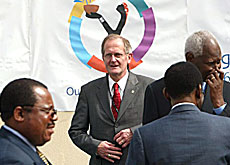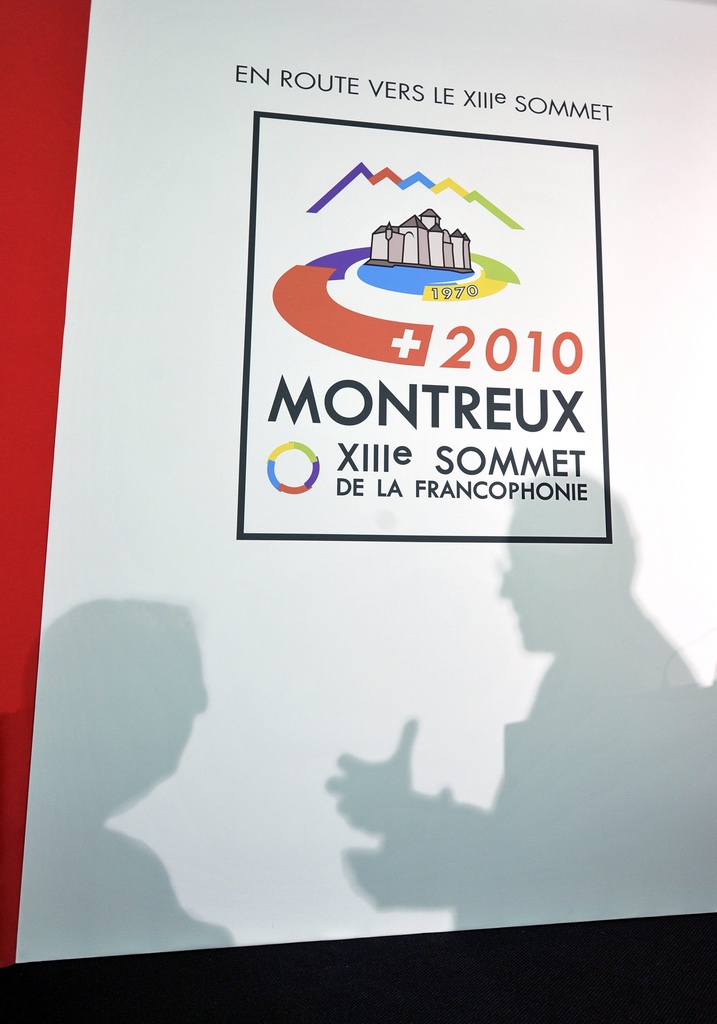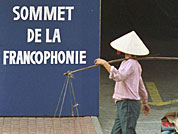Montreux takes on a Cajun flavour

Louisiana is a “special guest” at the Francophonie Summit of French-speaking nations, held this year in the Swiss city of Montreux on Lake Geneva.
David Emile Marcantel, a lawyer with a passion for Cajun music, tells swissinfo.ch that the southern state’s bilingualism is both fragile and dynamic.
Some 70 heads of state, 3,000 delegates and 600 journalists are expected to attend the 13th Francophonie Summit from October 22-24, which will focus on issues of global governance and democracy, sustainable development and cultural diversity.
Marcantel lives in Jennings, a town of 12,000 in the southwest of the state. He is also the founder of the online radio Radio Louisiane and Musique Acadienne, a Cajun record label.
swissinfo.ch: What type of Louisianian are you?
David Emile Marcantel: I was born into a family that has lived in Louisiana since 1700. The first Marcantel came over from Chambéry in France as a soldier. So we’re well established – we’ve been here for something like 14 generations.
My family was therefore here before the Acadians (see box) arrived. Louisiana was an area of refuge: the Acadians weren’t deported to Louisiana – they were deported to many other places in the world, but they came to Louisiana for refuge. Nowadays Louisiana is called the New Acadia, South Acadia, tropical Acadia…
swissinfo.ch: One doesn’t often meet a lawyer who has created an online radio and a music label.
D.E.M.: Let’s say I’m not the only lawyer who loves music! For me it’s a hobby which I value not only because I love music but because it’s useful for promoting French. It’s a means of ensuring that French will continue to be used. It’s like a cause, for me: it’s my duty to promote the survival of French in Louisiana.
swissinfo.ch: There was a time when people tried to eradicate French in Louisiana, but since the creation of the Council for the Development of French in Louisiana (Codofil) in 1968 there’s been a real effort to rehabilitate it.
D.E.M.: When that organisation was founded, speaking French was really looked down upon. If you were bilingual, you’d hide it. Speaking French in addition to English was considered a flaw. French is much more respected today.
Codofil kick-started the teaching of French in elementary schools and, as a result, hundreds of thousands of young people started learning French – easily more than a million in 40 years. There are also immersion schools that work well, where maths or science for example are taught in French. Those schools are the most successful at really making people speak French.
swissinfo.ch: Has this had a real impact on Louisiana? Do these children maintain a link with French?
D.E.M.: Up to a certain point. I don’t want to claim that we’re creating a vast population who speak French… The situation for French in Louisiana is precarious. There’s always pressure from American culture to eradicate French.
But there are now young people who are interested in French and who are getting involved in Cajun culture, forming bands that sing in French or going to festivals – that wasn’t the case previously because French was considered passé. If you’d held a [Cajun] festival 40 years ago, not one young person would have turned up! Nowadays it’s normal for bands to sing in French.
Cajun music is very popular in the south of Louisiana. At every festival – and there are a lot: celebrating shrimps, peaches, watermelons or whatever – there are always Cajun bands singing in French.
Although I haven’t got the impression that French is going to die here in the near future, the number of Cajuns dying is greater than new ones being “created” in schools. The French-speaking population is constantly dwindling in Louisiana.
swissinfo.ch: According to the 2000 census, 4.7 per cent of people in Louisiana speak French at home. How have things changed since then?
D.E.M.: There was a census in 2010 but we don’t know the results yet. But it’s a sure bet that fewer people speak French as their first language now.
swissinfo.ch: Louisiana and the Aosta Valley in northern Italy are “special guests” at the Francophonie Summit. Is that important for you?
D.E.M.: Yes. Louisiana should feel a member of the French-speaking family. We’re very proud to be invited to the summit. Of course, we can’t be a member [of the French-speaking organisation] – for that, the United States would have to be a member.
It’ll never happen, but if the US joined, Louisiana would never be invited to take part by the Americans! Louisiana’s participation in French-speaking summits is possible because America isn’t a French-speaking country!
A French colony known as Louisiana once stretched from the Great Lakes down to the Gulf of Mexico, with the Mississippi as its backbone, and which covered a third of what is now the United States.
This region was sold in 1803 by Napoleon, who had other fish to fry in Europe, to a young country called the United States. Louisiana, greatly reduced, joined the Union in 1812.
Louisiana is a melting pot: its first inhabitants were Native Americans, then French settlers, then from 1719 slaves “imported” from Africa, in addition to a wave of Cajuns immigrants throughout the second half of the 18th century.
The summit will be held in Montreux from October 22-24, 2010.
At the end of the meeting heads of state and government representatives will adopt a declaration summarising the issues agreed upon and will elect the new IOF secretary-general.
Before the summit the Francophonie organisation will be present during various summer festivals in Switzerland: Montreux, Locarno, Lausanne, Zurich and Lucerne.
Twelve conferences on the state of French will be held in various universities in French-speaking Switzerland between June and October.
French-speaking artists from Haiti, Ivory Coast and France will play in five French-speaking cities and one German-speaking city during October.
From October 19-24 Montreux will host public conferences on the themes discussed by government delegates. From October 20-21 Lausanne will host a meeting of the International Association of French-speaking Mayors.
(Adapted from French by Thomas Stephens)

In compliance with the JTI standards
More: SWI swissinfo.ch certified by the Journalism Trust Initiative




You can find an overview of ongoing debates with our journalists here . Please join us!
If you want to start a conversation about a topic raised in this article or want to report factual errors, email us at english@swissinfo.ch.